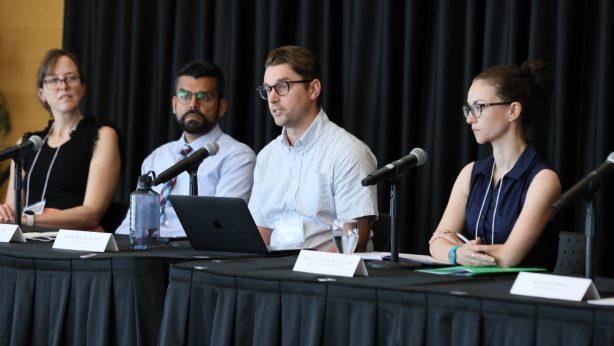Past time to stop platforming the Fraser Institute. Canada can afford public health care
Telegraph-Journal readers in New Brunswick would be forgiven if they read last week’s paper and thought that public health care is unsustainable, costing individuals and families a fortune, and should be abandoned.
After all, the newly Postmedia-purchased paper drew attention to a brand new report by the Fraser Institute, a conservative think tank, alerting “unaware” Canadians of the cost of public health care.
The report claims that a “typical Canadian family” of two parents and two children with an average household income of $156,086 will pay $15,847 for public health care this year. Single parents will pay $5,812, according to this report. Unattached single individuals will pay $4,907.
The report, titled “The Price of Public Health Care Insurance, 2022,” however, is an exercise in deception. Let us explain.
According to their calculations, in 2022, the report’s authors state that 23.9 per cent of tax revenue from income tax will be spent on health care. Let’s assume this percentage is correct. Since they simply cite to raw data tables and to “author’s calculations,” there is no way to know.
Therefore, one presumes that if you know the income tax paid by any family or individual, then it follows that 23.9 per cent of that will be paid for health care. Thus, first they calculate that an unattached single individual’s average income is $50,140. Then, they calculate the average total tax bill to be $20,528. And then 23.9 per cent of that number leads you to $4,907 paid for health care.
But this is not correct.
First, the report relies on the Fraser Institute’s “Canadian Tax Simulator” which has been criticized by economists for inflating the amount of taxes that individuals pay by thousands of dollars.
Second, the Fraser Institute’s fixation on the “average” instead of the more reliable “median” family is a political choice. The Canadian Centre for Policy Alternatives has criticized this as being designed to coax Canadian families – who tend to think of themselves as an “average family” – into believing that they pay nearly half their income in taxes.
Finally, by their own admission, the authors note that it is difficult to estimate how much an individual or a family pays directly towards health care costs because that’s simply not how health care spending works. Generally speaking, health care is funded from general revenues.
The attempt to then conjure up a number for how much individuals and families are spending on public health care becomes immediately political. This is because the question they must answer is: what revenue source must be excluded in this experimental calculation, and what is the political impact from it?
The answer to that question tells us exactly which team the Fraser Institute is playing for. Right off the bat, it appears that they have excluded corporate income taxes from this calculation. Accounting for corporate income taxes would probably yield a smaller percentage of income tax revenue spent on health care because the amount of income tax being considered becomes larger.
Now, it is possible that they already adjusted for the revenue from corporate income taxes in coming up with their 23.9 per cent figure, but – again – we don’t know that because they haven’t shared their calculations.
What about the impact from other sources of government revenue like sales taxes and royalties? Well, the authors note that sales taxes and other sources of revenue may also fund health care, but they say nothing about how they adjust for the impact of those revenue sources. Again, we are forced to assume that they simply did not include them in their calculations.
Their goal, clearly, is to leave the reader with the impression that the “average family” is shouldering a disproportionate burden in financing health care, and if only they knew, then maybe they’d be open to something else. What that “something else” could be, I’m sure, is extremely clear to the authors – and presumably corporate funders – of the report.
Make no mistake. This Fraser Institute report is the oldest political trick in the “think tank” playbook – Cherry-pick the numbers you want to work with, make acknowledgements about other data that exist to create the impression of academic integrity, ignore them anyway, and create the evidentiary basis to fuel political campaigns for your paymasters.
If they had submitted this report for peer review, it would have been shredded.
It does not require too much reading between the lines to find that the Fraser Institute’s report is intended to make the case for the privatization of health care and queue jumping for the rich who can pay for health care. Private health care takes doctors and health care staff and resources away from the public system, which results in longer wait times and a health care system more concerned about profits than quality health care.
Privatization of health care is not going to help Dieppe resident Marilyn Mannette who cannot afford to take time off work to go to her cancer treatments, as reported in the Telegraph-Journal on August 9. To maximize profits, private clinics accept the healthiest and wealthiest, often refusing services to the elderly or those with chronic conditions. The public health care system that has been gutted of the resources and staff it needs to optimally function is then expected to take care of these “costly patients.”
We can afford universal public health care. The Liberal-NDP Confidence and Supply Agreement promises to extend public health care coverage. Finally, the dream of a universal national pharmacare program is in sight. More accessible dental care, more doctors and nurses in the public health care system, and improved long-term care are also on the table.
The thing is, the Fraser Institute is not interested in good faith debate about public policy. They won’t disclose their funders, but have reportedly taken money from the Koch brothers, have been linked to “dark money” and the oil industry, and have even produced “research” claiming that the harmful effects of tobacco are exaggerated. That research was funded by – you guessed it – the tobacco industry.
So much is at stake and the Fraser Institute’s misleading report is at best a distraction from the important public conversations that need to be had on how to best deliver quality public health care in Canada.
Intellectually compromised and politically shrewd, the Fraser Institute dances to the tune of their corporate funders. Treating them as though they are a legitimate interlocutor in public policy debates is a disservice to society.

Tracy Glynn is the National Director of Projects and Operations for the Canadian Health Coalition
Photo: The New Brunswick Council of Hospital Unions (CUPE 1252) opposing the privatization of health care. Members, shown here, are rallying to save public health care at MP Robert Goguen’s office in Moncton in 2015. Photo from CUPE 1252.


